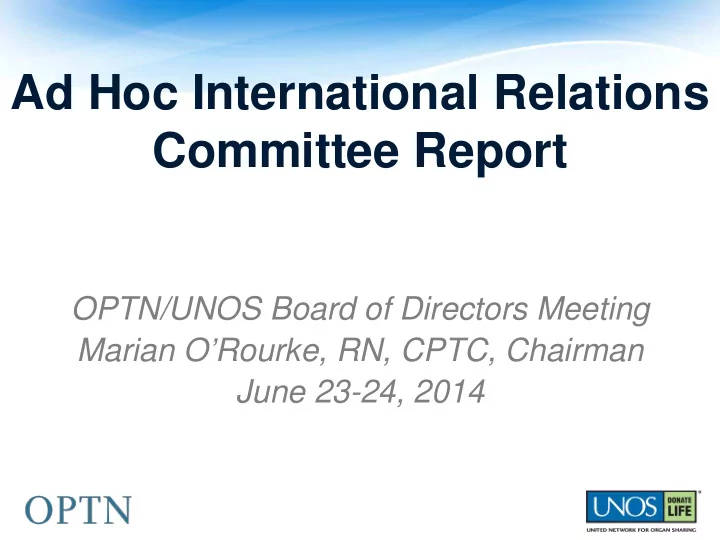

Ad Hoc International Relations Committee Report OPTN/UNOS Board of Directors Meeting Marian O’Rourke, RN, CPTC, Chairman June 23-24, 2014
Background: 2010 Policy Reviews • Not uniform; Citizenship • Unable to categorize non-US citizens living in the US; Categories • Unable to identify patients entering the US specifically for transplant Concerns with • 5% guideline widely interpreted as maximum allowable transplant audit policy threshold for non-US citizens living language in the US
Background: 2012 Policy Changes New citizenship categories 5% transplant threshold for non-US residents eliminated. Annual Report of Activities Related to Registration and Transplantation non-US Citizens/non-US Residents
Ongoing Committee Initiatives Publication of annual report of non-US citizens/non- US resident registrations and transplants Identify criteria for issuance of a voluntary survey to ascertain additional information on such activities No final conclusions made on thresholds for surveying programs Finalize the survey questions to elicit additional information
IRC Report of Non-US Resident Transplant Activity 245 (0.4%) In US for Transplant 617 (1.1%) Non-US Residents 58,693 372 (0.6%) Total WL Additions In US for Reason During 2013 Other than Transplant 58,076 (98.9%) US Residents
IRC Report of Non-US Resident Transplant Activity 32 Programs (3.9%) 69 19 Programs Programs (8.4%) (2.3%) 666 33 819 Programs Programs Transplant (81.3%) (4.0%) Programs
IRC Report of Non-US Resident Transplant Activity
Path Forward Continue to evaluate impact of transplantation of non-US residents on US system Add country of residence to future reports Educate transplant community on new data collection categories
Approved Committee Projects Define “Exhausting the Match Run” Review of Deceased Donor Import Policy
Define “Exhausting the Match Run” The Problem: Current policy is unclear regarding OPO level of effort required for national placement before offering organs to foreign entities for transplant. Attempting to literally “exhaust the match run” may cause an organ to become non-viable for many candidates and increase discards.
Define “Exhausting the Match Run” Joint subcommittee convened to identify specific circumstances when allocation cannot reasonably be completed in the US and organs may be offered outside of the US. Subcommittee data request: At what point on the match are organs rarely accepted by US programs? How far down the match were offers documented for exported organs?
Review of Deceased Donor Import Policy The Problem:
Background: OPTN policy gives the OPTN Member (Host OPO) responsibility for allocating deceased donor organs. Current practice assigns the OPTN (UNOS Organ Center) the responsibility for facilitating placement of deceased donor organs recovered outside of the US without a formal agreement (ad hoc organ exchanges). Although this placement process is not codified in OPTN policy, it does not appear to be prohibited by either NOTA or the Final Rule.
Consequences: Process does not allow for enforcement or monitoring of OPTN requirements; presenting a potential patient safety risk. Process is not well known by the transplant community; lacks transparency. Process consumes considerable UNOS Organ Center resources, though the organ yield is low.
Status IRC requested and received Executive Committee endorsement of a policy development path to better align policy with OPTN practice. IRC joint subcommittee will revise OPTN Policy 17 (International Organ Transplantation) to: Codify OPTN authority to serve in the role of OPO in ad hoc foreign organ placements; Address patient safety concerns; and Vet the current placement process for transparency and efficiency. Goal to increase utilization of these organs for US candidates.
Questions? Marian O’Rourke, RN, CCTC IRC Committee Chair Marian.ORourke@jhsmiami.org Jorge Reyes, MD IRC Committee Vice-Chair Reyesjd@uw.edu Deanna L. Parker, MPA IRC Committee Liaison Deanna.Parker@unos.org Special thanks to Sarah Taranto and Marissa Clark, MS
Recommend
More recommend